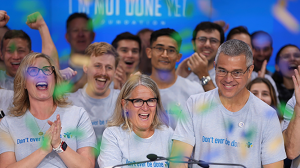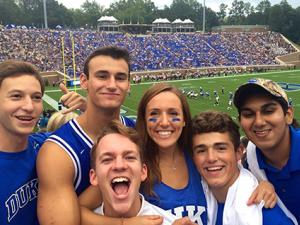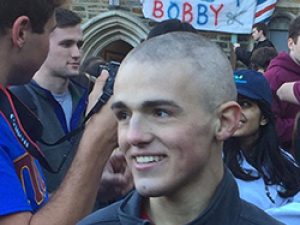I’m Not Done Yet Foundation Rings Nasdaq Opening Bell
Several Duke Cancer Institute (DCI) representatives were thrilled to join the founders of the I’m Not Done Yet Foundation, an important partner with DCI’s Teen and Young Adult Oncology Program, to ring the opening bell at Nasdaq on Friday, Oct. 7.
The Foundation was invited to ring the bell to celebrate their incredible work to bring awareness to the need for support for young adult cancer patients and survivors.
The I’m Not Done Yet Foundation was started by the parents of Bobby Menges, a Duke student who succumbed to cancer at 19 years old.
‘How can I help?’
Mallori Thompson, former administrative director of Cancer Support and Survivorship at Duke, used to keep a coin-sized metal angel at her desk. When she felt frustrated, she would touch the little token. “It reminds me of why I’m doing what I’m doing,” she said.
The angel was a gift from Liz Menges, whose son Bobby Menges was diagnosed with cancer for the third time in 2016 when he was 19 years old and a freshman at Duke University.
After a medical leave at home in New York, Bobby returned to school. He completed his sophomore year, taking a full load of classes and playing in the jazz band, all while receiving treatment at Duke.
In September 2017 he passed away from the disease. But he is still changing the experience of cancer for other young people, through the Duke Teen and Young Adult Oncology Program, a student fundraiser he inspired, and a foundation that his family started in his memory.
In 2017, Cheyenne Corbett, PhD, was forming plans for a support program at Duke for teens and young adults with cancer with Thompson, a medical family therapist on her team. The pediatric social workers and physicians all told Thompson, “You need to talk to Bobby.”
Bobby had that kind of effect on people. “He wasn’t the type to go to the hospital and get his treatment and leave,” said Liz. “He would butt in, and say ‘Who are you, and how can I help, and how can I get involved?’”
A desire to always do more
Bobby had received cancer care at several different places at different times. He was struck by the lack of any formal support services for teens and young adults. Kids had clowns and face painting to distract them. Older adults had self-image services and wigs.
But none of what was offered seemed appropriate for people his age, who are just beginning to live independently, think about careers, and decide who they are going to be. Bobby encouraged Thompson to build the program to facilitate peer support for young adults by building on the kind of activities they would normally be doing.
Drawing on those ideas, for its first event the Duke Teen and Young Adult Oncology Program tackled an escape room together. Its members have also gone rock climbing, done yoga, and tried Krav Maga.
After Bobby died, Liz found Thompson’s business card in Bobby’s wallet. She had met Thompson only for a second. But she remembered how excited her son had been about his conversation with her. “He told me about all the ideas that he had shared with Mallori. As soon as I saw her card, I knew this was something that he would want us to support.”
She called Thompson, and that conversation led to a relationship that resulted in the family’s foundation making significant annual gifts to Duke programs that support teen and young adults with cancer. Corbett, senior director of cancer support and survivorship, and Thompson were able to expand and elevate existing programming with this support making DCI’s Teen and Young Adult Oncology Program one of the leading in the nation through its comprehensive support services and research.
The I’m Not Done Yet Foundation is named for Bobby’s desire to always do more. “Even in the last days of his life when he wasn’t feeling good, he would always get up and do what he needed to do,” Liz said.
The foundation’s support funds a peer-to-peer support program for teens and young adults with cancer and their parents, called “Bobby’s Coaches,” an effort led by Gary Maslow, MD, in the Duke Department of Psychiatry and Behavioral Sciences. Bobby had served as a mentor for teen patients with chronic health issues through the ATLAS program in psychiatry, and Bobby’s Coaches grew out of that.
With the foundation’s support, the Teen and Young Adult Oncology Program has been able to expand services across DCI locations, to ensure that they are supported through their cancer with services that are dedicated to the unique needs of teens and young adults. Dedicated services include medical family therapy, psychology services, and navigation.
The foundation’s gift also provides financial assistance to help young cancer patients pay for fertility preservation services. “Bobby had so much chemotherapy and radiation for so long at such a young age. But talking about fertility was never on anyone’s radar,” Liz said. “By his third bout with cancer, he was aware of the effects the chemotherapy was having on his body and fertility. It made him so mad that no one had talked to him about this earlier.”
Because of this type of feedback, Corbett and her team developed the Duke Onco-Fertility Program to ensure education on fertility risk, access to fertility preservation services, and timely preservation intervention for those needing to start cancer therapies. The program’s nurse navigator works with teens and young adults to support them through this process, and the patient assistance funds ensure equitable access to preservation services.
‘A blue angel’
Bobby’s passion for helping others lives on among Duke students, through an annual Shave and Buzz fundraising event that he and other students started during his freshman year. To date, the events have raised more than half a million dollars for adolescent and young adult cancer services at Duke.
Students shaved their heads again this year, even though those who organized the event never even met Bobby. They exceeded their fundraising goal, raising almost $164,000. “These Duke students are amazing,” Liz said. “Their involvement and engagement have really amplified our efforts.”
Bobby’s love for Duke is one reason why she chose an angel as the symbol that she gives out in his memory. “He can’t be a Blue Devil anymore,” she said, “but he can be a blue angel.”





